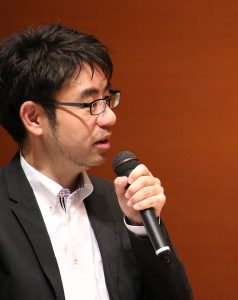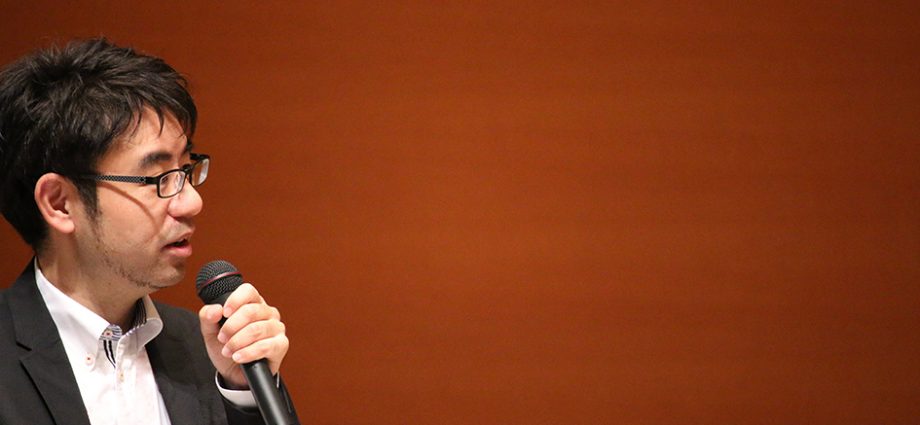By Isabelle Métrope, Managing editor of the International Choral Magazine
Dear Mr. Nobunaga: which region/city do you come from, and to which extent do your roots influence your work as a composer?
I was born in Tokyo. My parents are from the Hiroshima Prefecture, and my mother was a victim of the atomic bomb, so I grew up listening to her stories of the horrors of the A-bomb. This has influenced me to write many choral works to texts with prayer for peace.
Why did you become a composer and how did you get into professional (=intensive) music-making and writing?
I have loved looking at music scores since I was a child. Before I knew it, I was writing notes myself. My music teacher at my primary school had a strong passion for teaching choral music, and the encounter with him was also a major reason for me falling in love with music.
Becoming a professional composer was not my intention when I was a student, so I did not go to a school specialising in music. No one ever taught me piano or composition. I was purely self-taught. After graduating from University, I worked for a local government for three years, but I kept writing music in the meantime. I gradually became a professional composer after winning awards in several composition competitions.
Do you compose only for voices, or do you also compose for instruments, and what makes composing for choirs so unique (apart from the fact that you can add lyrics)?
The majority of my work is choral, but I also compose for instruments. Some bigger-scale works include Marimba Concerto (http://tiny.cc/yp96vz) and a piece for a wind orchestra. I also compose choral works accompanied by orchestra.
What makes choral music special is that human voices have broad expressions of emotion that instruments cannot match. I think that is the biggest strength. Plus, children, youth, and adults have different voice colours, respectively, that can only be expressed at their life stage, which also makes choral music fascinating.
Do you sing yourself?
I used to sing in a choir when I was young, but I don’t have opportunities to sing these days. Occasionally, I have opportunities to conduct choirs.
What are your favourite topics for composing choir music, and why?
It is a difficult question because I am interested in various composing techniques. I temporarily preferred soundscape-like techniques. From there, my area of interest expanded to techniques that create artificial echo as well as heterophony.
On the other hand, I also have a strong interest in presenting the beauty of melody lines simply, and writing melody lines matching the texts.
What music, composer, musician or period in music history represent your musical homeland?
I don’t think I have a particular “core” as such. My top interest is what the composers of our time think and communicate, and is not limited to choral music. Among Japanese composers, I was influenced by Akira Miyoshi.
What does choral singing mean for you?
It is my life itself.
What do you wish for the future of the choral world?
I don’t know much about the choral world other than that in Japan, so I can only comment on Japan. Choral music is a genre “to enjoy participating” rather than “to enjoy listening.” As a result, it is not easy to entice people who are not choral singers to concert halls. I think choral conductors, choral singers, and composers all need to think about how to bring people with different backgrounds to chorus concerts, like orchestra or opera concerts. I believe it would lead to the choral community becoming more popular. Secondly, for enhancing the culture of choral music, we need to create a lot of opportunities for children and the youth so they can recognise the joys of choral music and to participate in choirs. To achieve this, we may need a movement to change government policies. I believe it is important for people involved in choral music to have views for society, not just having fun on their own.
What are your current projects?
An opera, “Mountains and Seagulls” which premiered in Matsumoto City, Nagano in January 2022, will be performed again in Matsumoto City on 23 and 24 December 2023. I also have plans to compose some more Choral Opera and Grand Opera in the future. While composing choral works passionately as I have done so far, I want to do what I can in broader areas of stage arts.
 Born in Japan, in 1971, Takatomi NOBUNAGA graduated from Sophia University, Faculty of Humanities in 1994. Among the awards he received: the Asahi Award for Composition (choral music), 1994, 1995 and 1999, 1st Prize in the Sogakudo Japanese Song Competition (composition department), 1998, finalist of the New Composer Award held by the Japan Society for Contemporary Music, 2000, 2nd Prize in the Japan Music Competition (chamber music section), 2001. His major works are Cantos Nuevos for mixed chorus (or male chorus) and piano, Fragments –Notes of the War-Dead from Tokkotai Special Attack Units– for solo vocal (or male chorus) and piano, Marimba Concerto “The Crossed Sonar of Dolphins” , Opera “Mountains and Seagulls”
Born in Japan, in 1971, Takatomi NOBUNAGA graduated from Sophia University, Faculty of Humanities in 1994. Among the awards he received: the Asahi Award for Composition (choral music), 1994, 1995 and 1999, 1st Prize in the Sogakudo Japanese Song Competition (composition department), 1998, finalist of the New Composer Award held by the Japan Society for Contemporary Music, 2000, 2nd Prize in the Japan Music Competition (chamber music section), 2001. His major works are Cantos Nuevos for mixed chorus (or male chorus) and piano, Fragments –Notes of the War-Dead from Tokkotai Special Attack Units– for solo vocal (or male chorus) and piano, Marimba Concerto “The Crossed Sonar of Dolphins” , Opera “Mountains and Seagulls”
Some pieces for choir by Takatomi NOBUNAGA
Endlessly Flowing (Chapter 1, “From the Ruins” for mixed chorus a cappella) — Score info: https://www.panamusica.co.jp/en/product/11744/
Shunshu-Sanshu (Three Poems of Spring Sorrow) for mixed chorus a cappella
- Performance video, 1st piece: https://youtu.be/HUGDDYI5Qio
- Performance video, 2nd piece: https://youtu.be/HgJeS-G_Ccg
- Performance video, 3rd piece: https://youtu.be/j_dUKmNe4JE
- Score info: https://www.panamusica.co.jp/en/product/18258/
Kan Kan Kakurembo (Nursery Rhymes of Wakayama) for children’s or female chorus without accompaniment — Score info: https://www.panamusica.co.jp/en/product/8392/
Hab’ ein Lied auf den Lippen
- Performance video (Orchestra ver.): https://youtu.be/XBzC3c65XuI
- Performance video (Piano ver.): https://youtu.be/gFMJv_9CD48
- Score info: https://www.panamusica.co.jp/en/product/11759/
Gloria on the Horizon over the Sea (from “Two Glorias in Resonance” for mixed chorus and piano) — Score info: https://www.panamusica.co.jp/en/product/26989/
Pana Musica, Japanese distributor of choral sheet music, has created a list of Mr Nobunaga’s published choral works: https://www.panamusica.co.jp/en/appeal/takatomi_nobunaga/
Edited by Charlotte Sullivan, UK

